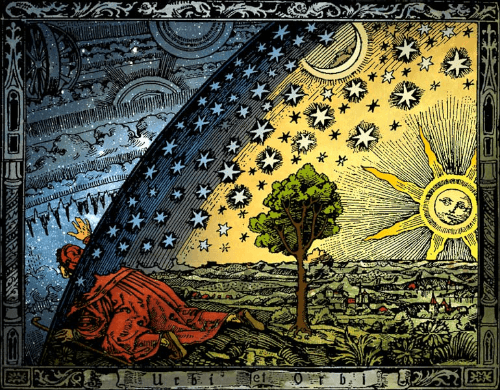
When pondering over the origins of the universe, the standard religious answer is “God did it, problem solved, now let’s move on to believing”.
Oh wait.
Evidence for this claim is … well so far, it is exactly zero. It also has a rather fatal flaw because you then need to explain the origins of this god. The standard religious answer to this god hypothesis quandary is to simply make up even more stuff on the basis of exactly zero observational data and claim that god always existed. You can of course eliminate a complete layer of pointless complexity here, chop out this god concept and suggest that the universe itself has always existed.
So why am I banging on about this today?
Well, I’m musing over it all in response to a FB posting by a deeply religious Muslim guy who wrote as follows …
The real fairytale is not that the universe was put into motion by a Grand Force with a purpose to serve, but that it came out of nothingness by sheer chance. It is only in Disney cartoons and fairytales that things come into existence from empty space. This is where physics fails the latter belief. As Stephen Hawking says: “Many scientists were still unhappy with the universe having a beginning because it seemed to imply that physics broke down. One would have to invoke an outside agency, which for convenience, one can call God, to determine how the universe began.”
So yes, the real fairytale is not that there was a Creator, but that there was none. And if you agree there must have been a Force behind this magnificent creation we know as our Universe, then know that I chose to call that Force God.
So I posted this comment …
Can science explain where the universe came from? – Nope.
Can religions explain where the universe came from? – It tries to by simply making stuff up on the basis of exactly zero evidence, but pretending to know and actually knowing are not the same.
The only honest answer is “I don’t know”, and anybody who claims they do know is either lying or delusional.
To which he replied …
David Gamble I never tried to explain where the universe came from. I did not even speak of any religion. Here is what I said: The universe and the laws of physics were created by sheer chance out of nothing, OR there was an outside force that resulted in the Big Bang.
If you believe there might have been some external agency/force involved, you are on my side. If you believe everything happened Disney style, then you need to explain how that is plausible? I mean would you believe me if I said my computer came out of thin air? Let me know how you reconcile this fairytale belief (if you hold it) with your apparent faith in laws of physics.
And if you believe there has to be an external agency or force, you just don’t know what it is, then thats an honest answer. Whatever that force is, I call it God. I’ll discuss this more in a formal piece.
… says the religious guy who claimed in his opening post that it must have been a force and that this force is god.
My response was as follows …
Hi Kashif N Chaudhry, it is always interesting to debate this topic.
So anyway you wrote …
// David Gamble I never tried to explain where the universe came from. I did not even speak of any religion. //
Within your opening post I got the impression that you were suggesting “god did it”. Yes you used the word “force”, but you then clearly claimed “I chose to call that Force God”.
– Do you understand why I would come to the conclusion I did when reading the words in the OP and knowing that they were written by a deeply devoted Muslim?
It all leads naturally to a set of questions (which is what makes the topic interesting)
– Has any reputable scientist ever seriously proposed that the universe and the laws of physics were “created” by “sheer chance” out of “nothing”? (I’m suggesting “no”, but I may be wrong about that)
– What data do you have that verifies the existence of a “force”?
– How do you measure and detect this force?
– Will you be publishing a paper on the topic of cosmological origins in a reputable peer-reviewed physics journal or perhaps a philosophical journal? (Translation: what degree of certainty are you going with here?)
I still stand by my “I don’t know”, so in that context I now wonder the following …
– Would you claim that you know, or are you simply presenting a hypothesis?
– If you are simply presenting a hypothesis, then do you have any thoughts on how it might be possible to test this hypothesis?
Here is a quote that in many ways sums all this up for me …
“I can live with doubt, and uncertainty, and not knowing. I think it’s much more interesting to live not knowing than to have answers which might be wrong. I have approximate answers, and possible beliefs, and different degrees of certainty about different things, but I’m not absolutely sure of anything, and in many things I don’t know anything about, such as whether it means anything to ask why we’re here, and what the question might mean. I might think about a little, but if I can’t figure it out, then I go to something else. But I don’t have to know an answer. I don’t feel frightened by not knowing things, by being lost in a mysterious universe without having any purpose, which is the way it really is, as far as I can tell, possibly. It doesn’t frighten me.” – Richard Feynman